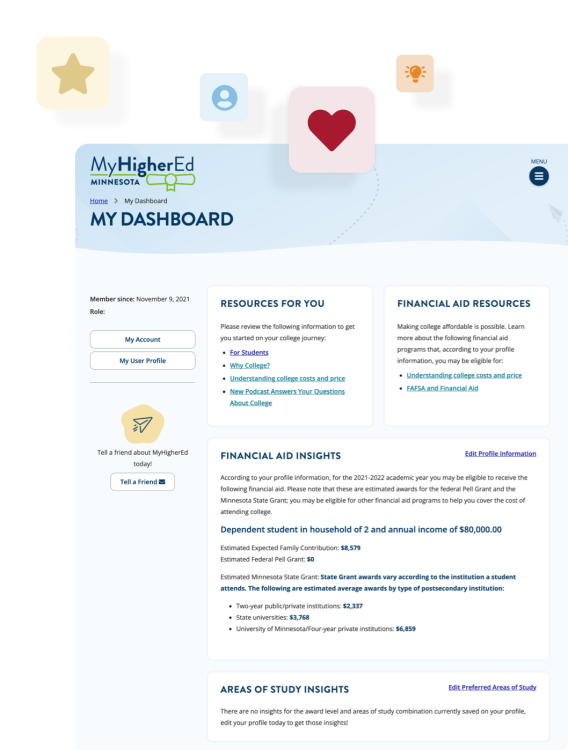As a working adult, you may have several reasons for considering to attend college for the first time: climbing up to a better position, changing careers, boosting your salary, finding a better job, or supporting your family. Or maybe you have decided to return to college to finish your degree. In either case, betting for higher education will likely pay off.
Choose a Pathway That Best Fits You
Education or training may feel impossible to you, especially when balancing other responsibilities in life -work, raising children, caring for other family members. Many institutions recognize the challenges adult students face and, in response, are offering programs to meet their needs, including classes offered online, at night and on weekends, accelerated programs, and adult degree completion programs.
Adults in Minnesota have many opportunities to pursue education and training beyond high school, including options that are at no or low cost to them. Here are five key pathways for adult students in Minnesota:

Find a program to achieve your career goals
Explore and compare among Minnesota programs.
1. Complete Adult Basic Education
Minnesota has nearly 300 programs offering free classes in English as a Second Language (ESL), math, reading, college prep, computers, and more. Adults can also complete an adult high school diploma or GED through Adult Basic Education.
GED testers in Minnesota can now get the first test in each subject free by entering the code MNGED30 when scheduling and paying for testing, while funding lasts.
- Learn more: https://education.mn.gov/MDE/fam/abe/
- Locate free classes across the state: https://hotline.mnabe.org/
2. Complete a Registered Apprenticeship
An apprenticeship is training that takes two to four years of combined on-the-job training and classroom instruction. It allows you to earn a salary while learning a skilled craft or trade. Apprenticeship programs are open to anyone with a high school diploma or anyone who is actively pursuing an adult high school diploma or GED.
- Learn more and find registered apprenticeships across the state: https://secure.doli.state.mn.us/apprenticeshipsponsor/
3. Earn a Short-Term Certificate
Minnesota State, private colleges, and training providers offer short-term training programs to help individuals get started in high-demand careers where there are lots of opportunities. Programs require a year or less of training and are available in many different career fields, from Agriculture and Natural Resources to Utilities.
If you want to explore other educational options, we recommend using the Minnesota Department of Employment and Economic Development's Career and Education Explorer. You may search among a wide range of career options for the educational program that best suits you.
4. Earn an Associate Degree
Students can receive annually up to $7,395 from the Federal Pell Grant, depending on their income, a State Grant award, and get the remainder of their tuition and fees fully covered by the North Star Promise Scholarship, if their family adjusted gross income is lower than $80,000 and they meet other eligibility.
Additionally, through the Workforce Development Scholarship program, the Minnesota Legislature has provided funding for hundreds of $2,500 scholarships ($1,250 per term) at the 30 community and technical colleges of Minnesota State in the following high-demand fields:
- Advanced Manufacturing
- Agriculture
- Health Care Services
- Information Technology
- Early Childhood Education
- Transportation
5. Earn a Bachelor's Degree
Students can receive annually up to $7,395 from the Federal Pell Grant, depending on their income, a State Grant award, and get the remainder of their tuition and fees fully covered by the North Star Promise Scholarship, if their family adjusted gross income is lower than $80,000 and they meet other eligibility.
Additionally, the Workforce Development Scholarship program has now been expanded to include $2,500 annual scholarships ($1,250 per term) to the seven state universities of Minnesota State for students who received a Workforce Development Scholarship from a Minnesota State college, graduated from the college with a two-year associate degree, and transfer into a corresponding bachelor’s program.
Under the U Promise Scholarship and Promise Plus free-tuition programs at the University of Minnesota, eligible Minnesota resident undergraduate students meeting the specified family income levels and who enroll at the University of Minnesota will be guaranteed funds to support their collegiate aspirations.




